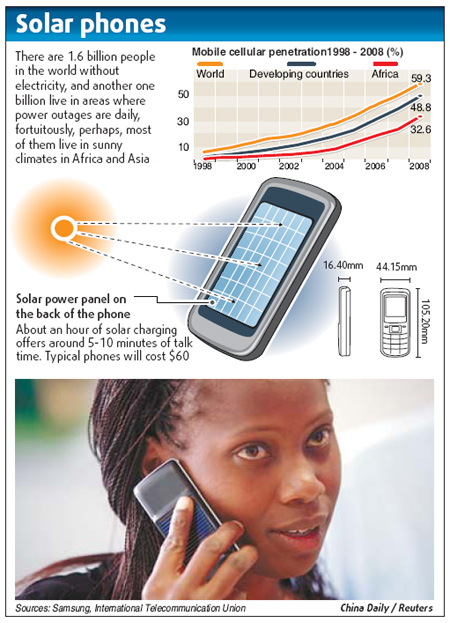Solar phones bring sunshine to businesses in Africa
KAMPALA/HONG KONG: Watching his sons kick around a ball made from tightly bound plastic bags, Ugandan handyman Jackson Mawa marvels at the way business has improved since he bought a solar-powered mobile phone.
"I am self-employed. Sometimes people call me and they find my (cell) phone is off. I have been having that problem a lot due to battery charging. So when (Uganda Telecom) brought out the solar phones, I got it that very day and since then I have never had any problem with my phone," said Mawa, clutching the device.
It might not sound like much but for Mawa and millions of people in Africa and Asia, with no connection to electricity grids or unreliable and expensive power access, these little solar-powered gadgets are proving to be revolutionary.
Farmers can check market prices before deciding which crop seeds to sow, speak to buyers from their fields and get weather forecasts.
No power, a lot of sunshine
Mobile phone penetration in Africa and the Indian subcontinent has been held back by a lack of electricity: there is simply no way to charge a cellphone in many rural areas of developing countries.
An estimated 1.6 billion people have no access to electricity at all, while another 1 billion people have no electricity for much of the day, according to estimates by development groups.
Fortuitously, perhaps, most of these people live in sunny climates. And this is where solar mobile phones come in.
"If you look at the map of countries with low tele-density, there is plenty of sunshine everywhere," said Rajiv Mehrotra, chairman of VNL, a company making solar-powered mobile network base stations in India.
Take Uganda's case: Just eight percent of the country's 32 million plus population have electric grid access. Even when the grid is there, like where Mawa lives in Mulago, a suburb of Kampala, the power is costly and the service intermittent.
Until solar cellphones were introduced, charging a phone in remote areas entailed a journey to the nearest town, where the phone battery could be charged at kiosks run on generators for relatively hefty fees.

Big market potential
There are more than 3 billion people using mobile phones around the world and most of the next billion users will come from emerging markets, particularly in the countrysides of these markets.
"There is a significant opportunity within developing markets where there is limited access to grid electricity," said Windsor Holden, principal analyst at telecoms research firm Juniper Research.
The makers of solar cellphones such as Nokia, Samsung and ZTE see the rural poor in these emerging markets as their main customer base rather than carbon-conscious consumers in the West.
"People's need to communicate is so high. It's running miles ahead of the power grids expansions," said Anne Larilahti of Nokia Siemens Networks.
A sellout
In Africa, Kenya's Safaricom has already sold out its first batch of solar-powered mobile phones made by ZTE since the phones were launched in August.
"It's selling pretty good because if we compare with other phones that (are also new to the market), they were not doing as well as we are having this one do," said Gladwell Mbugua, a Safaricom sales agent in Nairobi.
Reuters





















